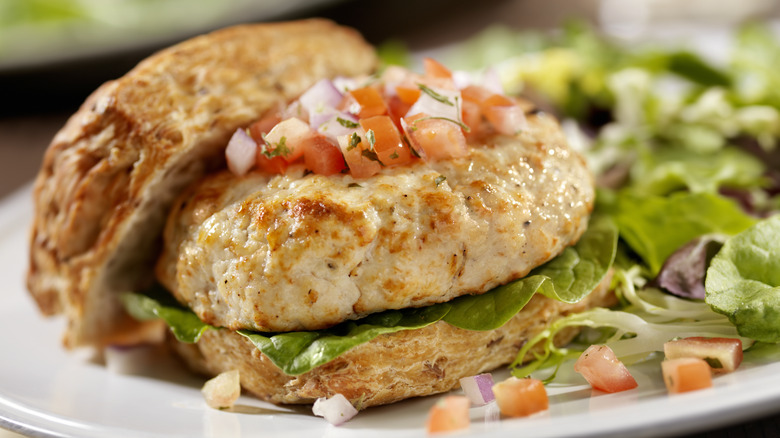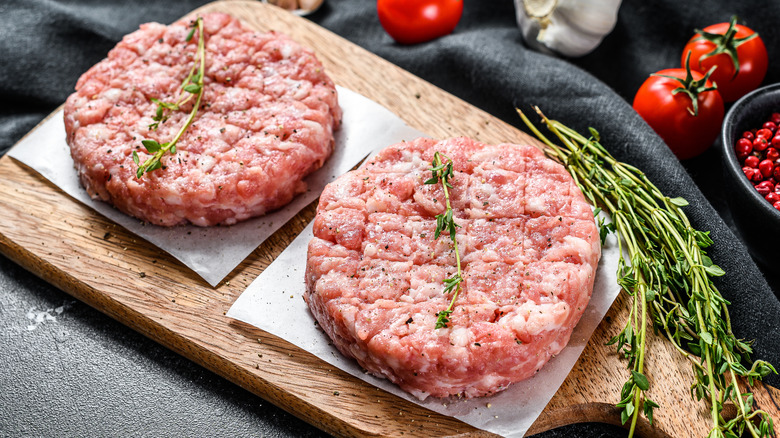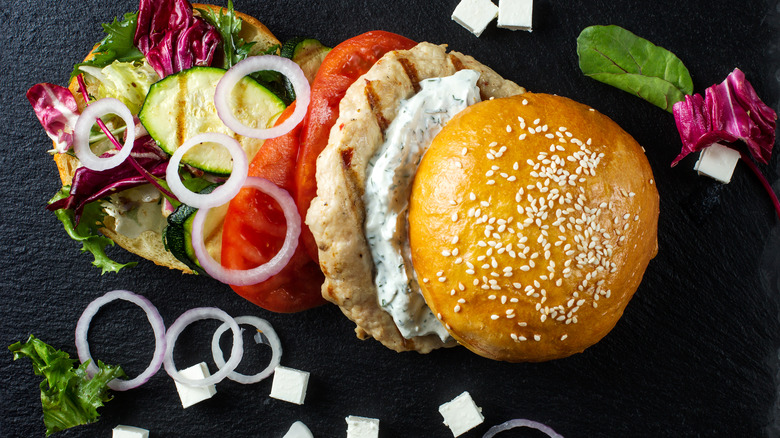What Temperature Should Fully-Cooked Turkey Burgers Be?
Usually, we're all for a medium-rare burger with a bright pink center — that is, unless it's made from poultry. When it comes to turkey burgers, the cooking process requires more caution. It's essential to keep a close eye on the patties and their internal temperature so you can grill them completely, yet without drying the meat into sawdust.
The ideal temperature for ground turkey is 165 degrees Fahrenheit, according to the USDA. Once the meat crosses this threshold, bacteria like salmonella should die off. A meat thermometer is very helpful for a precise reading and determining if the burger is ready. But, in terms of visual cues, the meat should no longer have any signs of pink and — if you're cooking the burger in a pan — it'll probably have a browned exterior. Just like with other meats, the patties will undergo a small amount of carryover cooking, so allow the meat to rest and relax before serving.
Unfortunately, turkey burgers get a bad reputation for being dry, and a fear of overcooking the meat doesn't help this issue. But, checking the internal temperature alleviates any temptation to undercook the meat. When cooking on the stove or a hot grill, this should take about five minutes per side.
Add more moisture to turkey burgers for the best results
Although closely measuring the temperature of your turkey burger will help avoid under- or overcooking the meat, there are other techniques to protect the lean protein. Start by adding moisture to the patties to further help them from drying out. Ground turkey usually has less fat than ground beef, which is why it benefits from the addition of extra ingredients and a blend of different parts of the bird. Dark meat tends to have more flavor and lipids, so — if you're making them from scratch — try to use a blend of dark and white meat, or all dark meat, to achieve a more durable and tasty burger.
The water content of fresh produce can also become an advantage for turkey burgers. Consider stirring in grated onion, as well as juicy chopped mushrooms or zucchini, to deliver sweetness and even more liquid content. Or, borrow a trick that prevents dry turkey meatballs and add eggplant or yogurt. A spoonful of mayo can also revive the lean meat and add extra fat. If the mixture gets too sticky, place the portioned patties into the fridge for a few hours or freezer for a half-hour to firm it up.
While summer begs for dazzling cross-hatch grill marks, you may find the meat easier to control in the oven or on the stovetop. Rather than fighting unruly flare-ups and varying temperatures, you can prepare the patties on high heat on a grill pan or add it to a buttery skillet and baste them while they sizzle.
A more flavorful turkey burger
As mentioned above, the top priority when preparing turkey burgers is making sure they're safely cooked through. Once you're confident about the heating process, then turn your focus to the seasonings. Moisture is important, but so is building a delicious bite. This starts with adding plenty of savoriness, like cumin or paprika, or a warm blend like curry powder or ras el hanout. Additional fresh herbs, like cilantro, scallions, or dill, can help bring a balancing freshness. We recommend including an umami component as well, such as soy sauce for a richer bite.
Even after cooking, there's an opportunity to round out the flavor. A glaze, like the one applied to grilled tamarind turkey burgers, imparts a major punch of tangy flavor in a hurry. This is especially helpful for ground proteins that don't need the tenderizing effect of a marinade. If you're short on time, brush on your favorite barbecue sauce in the final minutes of cooking as a shortcut to caramelized and smoky sweetness.
For a finishing touch, a great sauce or cheese can draw out maximum flavor and smooth over any dehydrated spots. A slice of cheese, a generous swipe of sauce, and a spicy pickled jalapeño can also impart a welcome combo of salt, fat, and acid. Mashed avocado, with a squirt of lime, and sliced tomatoes — or guacamole — provides a similar benefit. If you're in the mood for a Mediterranean-inspired meal, a crumble of feta, smear of tzatziki, and lemon juice can brighten the bite.



